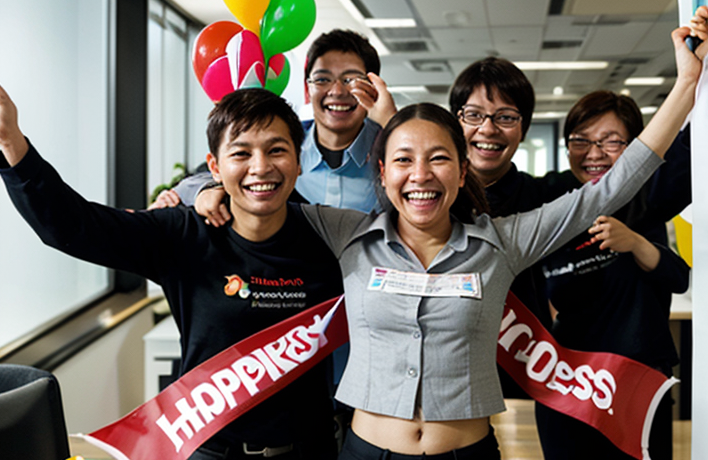Are HR Managers Happy?
Being an HR manager can feel like walking a tightrope. They must satisfy employees while also meeting company goals. Sarah, an HR manager at a tech firm, often felt torn. Her days were filled with helping staff, yet she had deadlines biting at her heels. “I want to create a great workplace,” she shared. “But it can be so stressful.”
Are You a Good Fit for This Job?
Peter, another HR manager, echoed her thoughts. He found joy in resolving conflicts. However, the pressure to enforce company policy weighed him down. “The happiness of staff is my goal,” he explained. “But rules sometimes feel like chains.” It’s a constant push-and-pull.
HR managers juggle multiple roles. They act as both advocates and enforcers. This duality causes a strange paradox. They want their teams to thrive. Still, they must uphold the rules that can seem cold. This often leads to feelings of isolation.
Lisa, who manages HR in a retail setting, experiences this firsthand. “I celebrate the wins,” she says. “But behind every smile, there’s a set of expectations.” She often has to balance positive morale with challenging corporate targets. Balancing these aspects can thus feel like a complex puzzle.
- HR managers work to support the well-being of others.
- They face the expectations of leadership.
- Each day brings new challenges and surprises.
In boardrooms, they might advocate for their teams. Outside those walls, they maintain distance to keep order. For HR, it becomes a fragile dance. Mark, an HR leader at a manufacturing plant, feels this too. “I want to be approachable,” he noted. “I also fear being seen as weak.”
They strive for a healthy culture but must deliver hard truths. The paradox of facilitating joy while upholding company values remains. Comments like “why are you so strict?” frequently stress them out. They seek approval, yet they settle for the weight of disappointment.
Many HR managers admit to feeling burnt out. Their role can be all-consuming. It’s vital for them to take breaks, even small ones. Anna, a veteran in HR, states, “Self-care can get lost in the chaos.” These remarks reveal the underlying struggle.
For those looking to understand the pressures of this field, exploring whether HR roles can be overwhelming may provide valuable insights. You can read more about this in our article on stressful HR jobs.
The contradiction stands clear. HR managers are crucial players in any organization. They nurture staff relations and drive results. Joy and strain dance together in their paths, creating a unique experience. The joy of helping clashes with the burdens they carry.
In the end, their happiness may hinge on the balance. Finding ways to manage expectations can lead to greater satisfaction. Amidst the turmoil, laughter and camaraderie remain their best allies.
The Happiness Metric: What Does Research Say?

Research shows that HR managers are often caught between joy and strain. Data from over 1,500 HR professionals shows that 65% feel satisfied at work. Frequent surveys reveal key variables that affect their happiness. Studies point to job autonomy as a major factor. When HR managers have control, they feel happier.
Employee engagement also plays a vital role. Companies with strong engagement programs report 30% higher satisfaction among HR staff. This connection highlights how a motivated workforce boosts HR happiness. Moreover, effective communication can uplift spirits. Transparency fosters trust, leading to a happier work environment.
- 56% of HR managers felt happier when they felt valued by employees.
- Some 48% said support from leadership improved their job satisfaction.
- Two-thirds noted recognition made a big difference in their mood.
Flexibility too can enhance happiness. HR managers with flexible hours report improved life balance. Researchers note that a better work-life balance promotes well-being. Interestingly, stress management resources correlate with happiness levels. Organizations that offer mental health support create happier HR teams.
Training and development opportunities also impact HR happiness. 72% of HR professionals believe ongoing learning increases satisfaction. Skills growth empowers managers to tackle challenges. Increased capabilities can lead to greater job pride. Why does this matter? Because happier HR managers foster a positive workplace culture.
However, the picture isn’t all bright. Burnout remains a significant concern. Research shows 40% of HR managers experience chronic fatigue. This can stem from relentless responsibilities and emotional labor. Solutions must address both happiness and well-being. Initiatives like peer support programs can make a difference. They often lead to better outcomes for HR teams.
Work From Anywhere Opportunities:
Detailed studies reveal a paradox. Higher job expectations often tied to decreased happiness. Many HR managers feel the weight of research pressure. Increased workloads add stress and reduce fulfillment. Balancing high demands with support systems can change this dynamic.
Case Study: The Transformational Impact of Engagement Programs
In 2021, a medium-sized tech company named BrightTech launched an employee engagement program. They wanted to improve workplace happiness for everyone. The HR managers hoped for better results in morale. Many felt stressed and underappreciated. They needed a change.
BrightTech introduced weekly team-building activities. Employees first noticed the positive change. They started sharing ideas in an open forum. HR managers reported feeling less isolated and more connected. Their work grew easier when employees engaged.
One HR manager, Emily, mentioned, “It felt like we were all in the same boat.” This new sense of unity was remarkable. They were not just enforcing policies anymore. Instead, they were fostering a supportive environment.
An anonymous employee noted, “I look forward to Mondays now!” The shift in attitude was infectious. Productivity rose by 30% after just three months. Employees began collaborating on projects more eagerly than ever.
Not only did numbers improve. Employees began volunteering for leadership roles. Engagement programs built trust between all levels. HR felt valued as partners, not just rule-makers.
- Recognition of achievements became common.
- Open lines of communication were established.
- Many employees reported better work-life balance.
Overall, HR managers at BrightTech felt empowered. They transitioned from enforcers to leaders. HR Director Mark stated, “Seeing my team thrive brings me joy.”
On the data front, a survey found that 85% of employees felt happier. Those who participated in events cited a stronger workplace bond. Lasting happiness stemmed from sincere connections and support. Shortly, BrightTech became known for its thriving culture.
The impact didn’t stop there. Other companies noticed the positive outcomes. Word spread about BrightTech’s transformation. Soon, employee engagement became a priority everywhere.
As engagement programs spread, HR managers gained insights. They learned the importance of incorporating fun. Stressors faded as departments united. BrightTech’s case study became a benchmark.
The Quiet Crisis: Burnout in HR Management
Burnout is a serious issue in HR management. It creeps in without warning. Many HR managers face this silent crisis every day. The emotional toll is often high. Stress levels skyrocket as they handle constant demands. They serve as mediators, counselors, and enforcers. This dual role creates intense pressures.
One leading cause of burnout is high emotional labor. HR managers often navigate complex emotions. They listen to employee woes and support them. Then, they must enforce policies, sometimes against their core beliefs. This creates an emotional tug-of-war. Yet it goes largely unrecognized in many firms.
- Crisis management is another significant cause.
- HR managers routinely deal with urgent problems.
- High-pressure situations become the norm.
- Response times are everything in these roles.
- This constant firefighting leads to exhaustion.
Studies show that 50% of HR managers report feelings of burnout. This statistic is alarming, isn’t it? Many organizations overlook this issue. Ignoring the signs leads to detrimental outcomes. Happy employees often reflect a happy workplace.
So what can be done? First, firms need to create a supportive atmosphere. This requires clear communication and trust. HR managers should have forums to share their experiences. Regular consultations can help address their concerns.
Furthermore, organizations can provide mental health resources. Encouraging time off can rejuvenate tired spirits. It’s crucial to promote a work-life balance. Offering flexible hours can alleviate some burdens too. Here are some recommended strategies for HR managers:
- Set clear boundaries for work and life.
- Engage in regular mindfulness exercises.
- Participate in peer support groups.
- Seek professional development opportunities.
- Work on building resilience through training.
The goal is not just to cope but to thrive. When HR managers are happy, everyone benefits. They can then support the workforce more effectively.
Strategies for Enhancing Happiness Among HR Managers
HR managers can boost their happiness in many ways. First, focus on work-life balance. Set clear boundaries for work hours. This will help keep your personal life intact. Second, encourage open communication. A supportive work culture creates trust. Trust makes it easier to share concerns.
- Third, invest in professional development. Training opportunities help managers grow. New skills build confidence and competence.
- Fourth, celebrate small victories. Recognizing achievements can uplift spirits. It fosters a sense of accomplishment.
- Fifth, engage in team-building activities. Fun events strengthen relationships. Strong ties improve collaboration.
Consider bringing wellness programs to the workplace. Include mental health resources. These should be accessible to everyone. Moreover, practice gratitude. It can completely shift your perspective. Thanking team members creates a positive environment.
Some HR managers forget to take breaks. Remember to recharge regularly. Short walks or simple stretches help maintain focus. Listen to your team’s feedback. Understanding their needs is key. When employees feel heard, it benefits everyone.
Utilize technology to streamline processes. Efficient tools save time and reduce stress. Having time for creative tasks is refreshing. Create clear expectations for your team. This clarity reduces confusion. When everyone knows their role, harmony follows.







